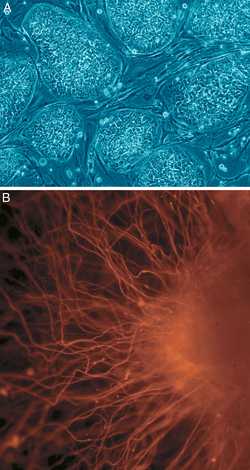Judge rules stem cell proposal to remain on New Jersey ballot
Tuesday, September 25, 2007

Superior Court Judge Neil Shuster ruled that a New Jersey ballot proposal to fund stem cell research would stay on the November 6 ballot. Under the proposal, previously approved by the state Senate and Assembly and signed by the governor Jon Corzine, New Jersey would borrow US$450 million over a ten-year period to be used to fund stem cell research. Shuster's ruling was in response to a suit by the pro-life Legal Center for the Defense of Life on behalf of 15 New Jersey residents and the anti-abortion group New Jersey Right to Life.
The suit asked for an injunction to keep the proposal off the ballot, arguing that the ballot measure was deceptive since it did not reveal that the funding might go to human cloning and that property taxes might be raised as a means of paying off the debt. Proponents of the measure argued that the bill would not in fact allow cloning and that allowing the use of property tax to pay off debt was standard for similar ballot measures.
Shuster ruled that the plaintiffs had waited too long to file their case and that they did not made a convincing enough claim of imminent harm to justify the unusual and disruptive measure of removing an item from the ballot. An injunction now would create complications to military personnel who vote by mail as well as civilians who use absentee ballots.
Stem cell research has been a controversial topic in the United States, where it is wrapped up in the abortion debate. Opponents, principally religious groups, have condemned such research when it would use embryonic stem cells which they view as endorsement of abortion. Since many of them view abortion as murder, the use of embryonic stem cells is in their eyes tantamount to murdering people for scientific research. Also, some have expressed concern that the research is a slippery slope to reproductive cloning. In response to funding restrictions on federal money to stem cell research and an earlier veto by President Bush of a federal bill for stem cell research a number of states such as New Jersey and California have adopted measures to fund stem cell research, which proponents argue could be useful for curing a variety of diseases, including Alzeimer's, Parkinson's and diabetes.
Related News
- "New Jersey gives $270 million to Stem Cell Research Center" — Wikinews, December 20, 2006
- "Study will examine treating heart damage with adult stem cells" — Wikinews, November 8, 2006
- "Bush uses his first veto ever on stem cell bill" — Wikinews, July 19, 2006
- "Stem cell bills passed by US House and Senate" — Wikinews, July 19, 2006
Sources
- Jeremy W. Peters. "In Trenton, Judge Says Item on Stem Cells Stays on Ballot" — New York Times, September 25, 2007
- "New Jersey Judge Rules $450M Stem Cell Bond Proposal Must Remain on Nov. 6 Ballot" — Kaiser Network, September 25, 2007
- Elizabeth A. Meyers. "Singh Urges Baroni to Join in Calling on Anti-Stem Cell Group To Drop Lawsuit" — PoliticsNJ, September 24, 2007
- "A look at New Jersey's $450 million stem cell referendum" — NJ.com, September 24, 2007
- Tom Hester Jr.. "N.J.: Stem Cell Hearing Set" — Associated Press, September 24, 2007
- Nigel Hawkes. "It is a therapy that holds promise, but it is not without numerous risks" — The Times, November 8, 2006
- Dana Bash and Deirdre Walsh. "Bush vetoes embryonic stem-cell bill" — CNN, September 25, 2006
External links
- Nick Anthis Stem Cell Drama Scienceblogs, July 18, 2006
- Nick Anthis States Continue to Take Stem Cell Research into Their Own Hands Scienceblogs, July 17, 2006